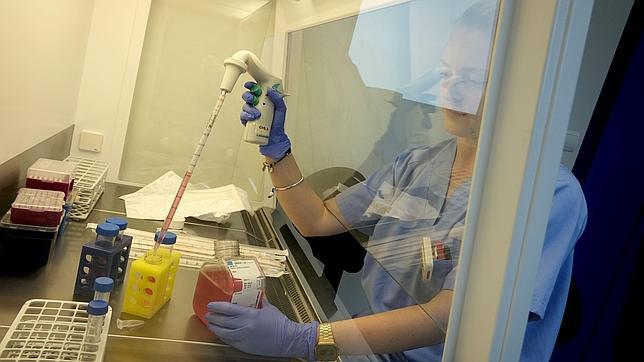Ebola - the trivializing of a deadly virus
According to WHO figures published on Thursday 635 cases were
registered of hemorrhagic fever in the area affected by Ebola most
violent Guinea and neighboring Liberia and Sierra Leone since the
beginning - 399 people died.
The World Health Organization (WHO) called for "drastic measures" and
convened a conference of eleven Health Minister of West Africa in Accra,
Ghana for the July 2 and 3 a.
"Through the fault of our government, whether they like it or not, has the disease spread into the interior of the country," says Alphadio who wants to name but his first name. "You have such a spread lies that our partners and even the population at some point put his hands in his lap. And that is the result, the epidemic is spreading throughout the country."
His colleague Kankou Marah agrees: "We all know today that the Government upholds its interests and avoids the population to tell the truth, not to sell to investors." Even a religious leader in the Muslim Guinea criticizes: Thierno Ousmane Camara Imam calls "by the President, this disease, which unfortunately continues to make families unhappy not to belittle." In early April, Guinean President Alpha Conde declared at the WHO headquarters in Geneva. "Right now the situation is under control and we knock on wood, that there are no new cases" Until then, the death toll in the country at under a hundred was.
A few days later Condé welcomed the regional leaders at a meeting in Conakry, saying that he was grateful for coming, "despite all the noise about Ebola." This "noise" is used mainly by the aid organization Doctors Without Borders (Médecins sans frontières, MSF), which is active in the region since the outbreak of the epidemic. On Monday, MSF stated that the situation tools with a 60 outbreaks in Guinea "out of control". In response, Condé criticized the behavior of the MSF and other international organizations locally as "not perfect".
The Ebola virus is transmitted by blood and other body fluids. Infected suffering from fever, muscle aches, diarrhea to internal bleeding and organ failure. For some types of pathogen, the disease is fatal in up to 90 percent of cases. To date, there is neither a vaccine nor therapy. According to observations by journalists from the AFP news agency there in Conakry now no more awareness campaign, does not have radio or television was still on the streets. At the stations, the port and airport controls are kept to a minimum.
In neighboring Liberia, citizens outraged: "What does the health minister, to sensitize the population, most of whom are illiterate Nothing," says the 38-year-old secretary Sneh Magdel in the capital Monrovia. As in Conakry, there is also no explanation: "We have no budget for huge awareness campaigns," said an anonymous employee of the health system. In New Kru Town, the largest Ebola stove Liberia, says the inhabitants Peter Jleh: "We are Africans, we are used to living in the community, and we will continue to live together and shake hands." http://translate.google.com/translate?hl=en&sl=auto&tl=en&u=http%3A%2F%2Fwww.rp-online.de%2Fleben%2Fgesundheit%2Fnews%2Fkritik-an-guinea-ebola-die-verharmlosung-eines-toedlichen-virus-aid-1.4347761
"Through the fault of our government, whether they like it or not, has the disease spread into the interior of the country," says Alphadio who wants to name but his first name. "You have such a spread lies that our partners and even the population at some point put his hands in his lap. And that is the result, the epidemic is spreading throughout the country."
His colleague Kankou Marah agrees: "We all know today that the Government upholds its interests and avoids the population to tell the truth, not to sell to investors." Even a religious leader in the Muslim Guinea criticizes: Thierno Ousmane Camara Imam calls "by the President, this disease, which unfortunately continues to make families unhappy not to belittle." In early April, Guinean President Alpha Conde declared at the WHO headquarters in Geneva. "Right now the situation is under control and we knock on wood, that there are no new cases" Until then, the death toll in the country at under a hundred was.
A few days later Condé welcomed the regional leaders at a meeting in Conakry, saying that he was grateful for coming, "despite all the noise about Ebola." This "noise" is used mainly by the aid organization Doctors Without Borders (Médecins sans frontières, MSF), which is active in the region since the outbreak of the epidemic. On Monday, MSF stated that the situation tools with a 60 outbreaks in Guinea "out of control". In response, Condé criticized the behavior of the MSF and other international organizations locally as "not perfect".
The Ebola virus is transmitted by blood and other body fluids. Infected suffering from fever, muscle aches, diarrhea to internal bleeding and organ failure. For some types of pathogen, the disease is fatal in up to 90 percent of cases. To date, there is neither a vaccine nor therapy. According to observations by journalists from the AFP news agency there in Conakry now no more awareness campaign, does not have radio or television was still on the streets. At the stations, the port and airport controls are kept to a minimum.
In neighboring Liberia, citizens outraged: "What does the health minister, to sensitize the population, most of whom are illiterate Nothing," says the 38-year-old secretary Sneh Magdel in the capital Monrovia. As in Conakry, there is also no explanation: "We have no budget for huge awareness campaigns," said an anonymous employee of the health system. In New Kru Town, the largest Ebola stove Liberia, says the inhabitants Peter Jleh: "We are Africans, we are used to living in the community, and we will continue to live together and shake hands." http://translate.google.com/translate?hl=en&sl=auto&tl=en&u=http%3A%2F%2Fwww.rp-online.de%2Fleben%2Fgesundheit%2Fnews%2Fkritik-an-guinea-ebola-die-verharmlosung-eines-toedlichen-virus-aid-1.4347761









